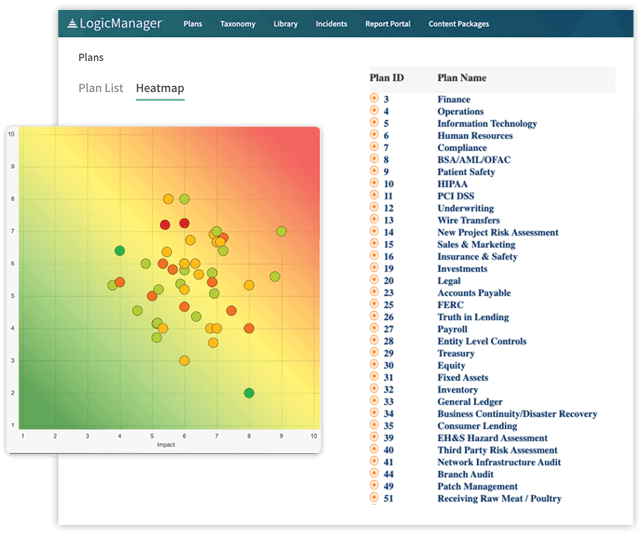Model Risk Management
Protect Your Reputation with Model Risk Management Software
LogicManager’s Model Risk Management Software empowers organizations to better identify and assess model risk, record the review and validation process, and consolidate relevant policies and regulations in one place. Mismanagement of model risks can lead to dramatic financial losses, misinformed business decisions, and damage to your organization’s reputation. With our risk-based approach, you will be able to address your model risks in order of operational criticality.
- Create a centralized repository of the models that are being used within your organization
- Identify the most critical risks across your enterprise with out-of-the-box, editable, and objective risk assessments
- Provide overarching model risk governance and automate workflows to engage the proper stakeholders for reviews, approval steps, and validation
- Manage issues and findings within a risk-based system that allows you to associate events with the associated risks, people, policies, procedures or controls to tie issues to their root cause and prevent repeat occurrences
- Use our robust Reporting & Dashboards provide relevant model risk management data to stakeholders and leadership to inform and deliver better business decision making

Why Logicmanager? – Users of LogicManager’s ERM software explain how they have benefited from our platform and expert advisory service.
Customer Success StoriesExplore How Companies Overcame Challenges With Our ERM Solution

Georgia Farm Bureau Mutual Insurance Company® Case Study
Georgia Farm Bureau Mutual Insurance Company® transformed the reputation and value-add of their risk management department by leveraging LogicManager’s software.

Regulatory Challenges and Enterprise Risk Management Case Study
How one of LogicManager’s customers in the financial services industry has used LogicManager to manage regulatory challenges with a best practice Enterprise Risk Management program.
What Our Customers Are Saying...
The LogicManager DifferenceA Holistic Approach to Model Risk Management

Business Decision InsightsFocus on What’s Important
Through our ERM software, we enable our customers to allocate more time to strategic risk management, reducing their involvement in tedious administrative activities like data cleansing and manipulation. Our solution enhances operational efficiency while uncovering the “unknown knowns” that risk managers may overlook, thus ensuring proactive identification and mitigation of risks.
Customer ExperienceStreamline Your Risk Management Program
Unlike other software that requires IT professional customization, our solution allows customers to control engagement through an end-user configuration. This approach enables faster time-to-value and allows organizations to evolve their programs over time, not to mention a quicker return on investment.


Risk-Based ApproachPrepare for Tomorrow’s Surprises Today
A risk-based approach is the key to effective governance, risk, and compliance. By adopting this methodology, organizations can prioritize their efforts across different departments, recognize potential hurdles and crucial interdependencies, and allocate resources appropriately. Embracing a risk-based mindset allows organizations to strategically allocate their resources to areas that hold the most value in terms of privacy protection and compliance.

Complimentary Download Model Risk Management Datasheet
Learn more about how LogicManager empowers organizations to meet guidelines on Model Risk Management issued by the Federal Reserve and Office of the Comptroller of the Currency, which helps financial institutions and supervisors assess their organizations’ model risk management process.
CapabilitiesAn All-In-One Model Risk Management Platform
Frequently Asked QuestionsFoundations of Model Risk Management
Model risk management refers to the process of identifying, assessing, and mitigating risks associated with the use of mathematical models within an organization. These models can be of various types, such as financial models, statistical models, predictive models, machine learning algorithms, or any other mathematical representations used to make decisions or predictions.
Model risk arises because all models have limitations and assumptions, and they may not fully capture the complexities of the real-world systems they are intended to represent. Model risk management is crucial because incorrect or poorly validated models can lead to significant financial losses, reputational damage, or regulatory compliance issues.
Key components of model risk management typically include:
- Model Governance: Establishing a framework for model development, validation, and ongoing monitoring. This involves defining roles and responsibilities for model developers, validators, and stakeholders, as well as documenting model policies and procedures.
- Model Validation: Independent review and testing of models to assess their accuracy, appropriateness, and limitations. Validation ensures that models are fit for their intended purpose and comply with regulatory requirements.
- Risk Assessment: Identifying potential risks associated with model usage, including errors, biases, and uncertainties. This involves evaluating the impact of model outputs on business decisions and understanding the potential consequences of model failure.
- Model Documentation: Comprehensive documentation of model methodologies, assumptions, and limitations to ensure transparency and facilitate external review.
- Change Management: Managing model changes and updates to ensure that any modifications go through appropriate approval, testing, and validation processes.
- Stress Testing: Subjecting models to extreme scenarios to assess their robustness and performance under adverse conditions.
- Reporting and Communication: Regular reporting of model performance and risk assessments to relevant stakeholders, including senior management and regulatory authorities.
Model risk is the possibility of adverse outcomes or financial losses resulting from inaccuracies, limitations, or misapplication of mathematical models used in decision-making. Factors contributing to model risk include flawed assumptions, data quality issues, model complexity, lack of validation, changing environments, and human errors. Effective model risk management is crucial to identify, assess, and mitigate potential risks and ensure the reliability of models in supporting business decisions.
Request a DemoLearn How LogicManager’s Model Risk Management Can Transform Your Enterprise Risk Management Program
Speak with one of our risk specialists today and discover how you can empower your organization to uphold their reputation, anticipate what’s ahead, and improve business performance through strong governance.

